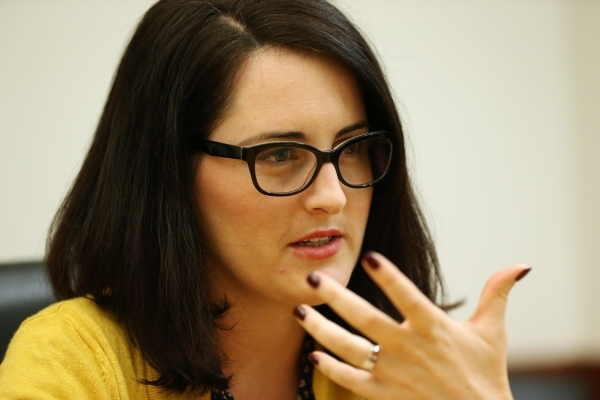Questions linger after report of sex misconduct at NSHE
After months of uncomfortable silence, Mallory Levins finally mustered the courage to speak up: Her colleague at the Nevada System of Higher Education, she told her bosses, had made a habit of masturbating at work while she was forced to listen.
Hank Stone seemed to grow progressively bolder as time passed, Levins said. Sometimes, he even gratified himself from his open office as Levins sat in her own desk just a few feet away.
"He just got louder and louder," Levins said during an interview with the Review-Journal this week. "I was beginning to feel unsafe."
Levins, a college access specialist whose career in higher education began six years ago through an NSHE internship, thought her worries were over after the alleged offender quietly retired. But after transferring to the University of Nevada, Las Vegas in late 2013, she was stunned to discover that UNLV had contracted Stone as a real estate attorney, and she even shared a building with him on the school's sprawling main campus.
She approached the school's human resources department in August 2014 seeking answers. Did UNLV administrators know about the allegations that she raised before NSHE, the school's overseeing agency? Did NSHE carry out an investigation? If so, were her claims deemed baseless?
University and system officials, citing concerns about employee privacy, have been reluctant to offer any explanations. They, along with Stone, declined to speak with the Review-Journal for this article.
Communication breakdown
The case has long troubled Levins and unveils a communication lapse between UNLV and its parent institution. Experts in higher education policy say the incident bears the signs of a management blunder, apparently caused by a lack of documentation after Levins made the initial complaint in May 2013.
"The fact that she didn't get any final read from them is a problem," said Melora Sundt, an education professor at the University of Southern California. "It suggests they just let it go because he left. And without a paper trail, (Stone) is just going to keep getting rehired."
At least one answer emerged from an email exchange obtained by the R-J that indicates that UNLV's top administrators were unaware of the claims made against Stone when they offered him a job.
"Our initial retention of Hank occurred after approval by (NSHE Chancellor Dan Klaich)," UNLV General Counsel Elda Sidhu wrote to Levins' former NSHE supervisor in an August 2014 email. "The issues you raise with respect to Hank's employment with and departure from NSHE have never been shared, uttered or even implied by any representative of NSHE."
Policy change
NSHE has since responded to the incident by quietly introducing a policy change that allows NSHE and its eight institutions to share confidential information about their employees. NSHE attorney Brooke Nielsen brought the proposed change before the system's 13-member Board of Regents in early September, two months after Las Vegas Sun publisher Brian Greenspun referenced Levins' outcry in a column.
"We can't talk about personnel matters," Board of Regents Chairman Rick Trachok said during an editorial board meeting with the Review-Journal shortly before the policy change was brought before the NSHE board. "In the past, we've treated each of our eight institutions as separate legal entities. ... (But) we're a single entity. All checks are signed by the Board of Regents, so this policy change will acknowledge that fact and there will be free flow of appropriate information among the institutions."
Several regents interviewed this week expressed concerns about the apparent communication lapse between the two entities, noting that NSHE officials seemed confident they acted appropriately when the allegations were first brought before the system. The regents will decide whether to approve the NSHE proposal at their regular meeting on Dec. 3.
Still, it's not clear whether a different policy would have prevented UNLV from hiring Stone. And because neither agency is legally bound to speak about the case, it's impossible to know whether administrators committed any wrongdoing in employing Stone a second time.
"We don't know what the results of the investigation actually showed," said Joseph Seiner, a professor at the University of South Carolina School of Law who specializes in labor litigation. "Assuming that this (inappropriate behavior) was taking place, they need to look under the lens of what they may have done to other employees in similar circumstances, what his individual protections are and what their policies are for rehiring. There's a bunch of state-level employment questions that go into this that would need to be answered."
Lingering concerns
Stone, meanwhile, has since stopped working at UNLV. His contract with UNLV expired in August, and the school has not renewed it a second time.
Whether the school can legally hire him again remains unclear. Greg Kamer, a Las Vegas-based attorney whose firm specializes in representing employers, says Nevada statutes may prevent UNLV and NSHE from opting not to hire Stone again based on Levins' allegations. One law, for instance, bars employers from blacklisting fired employees.
Employers typically don't discuss sexual misconduct allegations for fear of encroaching on workers' privacy, and neither entity is required to tell Levins what resulted from her complaints. But administrators' reluctance to speak makes Levins fear that UNLV and NSHE may not be doing enough to protect those who report workplace harassment.
"I think the reason why sexual harassment like this still happens in the workplace is because people don't speak up," Levins said. "If I had known then what I know now, I wouldn't have just accepted him going into retirement and taking their word for it that he'd never be back. I would hope that if someone else finds themselves in a situation like mine, that they wouldn't have to learn the hard way."
Levins also fears about her career's future after going public with the allegations: The same week in which the editorial boards of Las Vegas' two newspapers asked NSHE leaders about their management of Stone's case, a system administrator notified her that she would be gradually losing control of Go to College Nevada, a college outreach program she has overseen since nursing it to life in 2011 while working for NSHE.
The program, which aims to create a pathway for low-income high school students to attend a university, was almost shut down after running out of federal funding two years ago. Levins has since kept it alive through in-kind donations, efforts from UNLV staff and volunteers.
"It's my baby. Part of me worries they could take it all away at any point," Levins said. "But there's nothing I did wrong."
Contact Ana Ley at aley@reviewjournal.com or 702-224-5512. Find her on Twitter @la__ley.




























